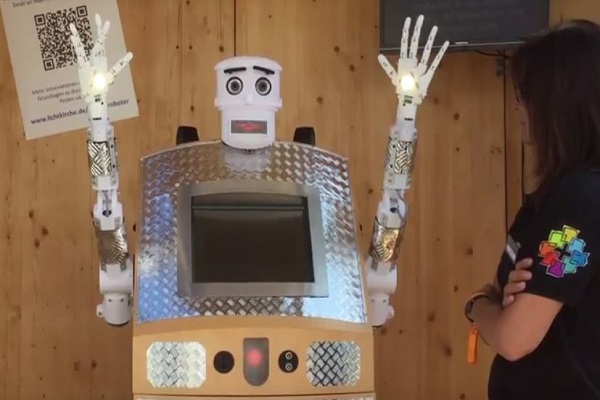
Robot Priest Introduced for 500 Year Anniversary of Reformation
- By Gary Nguyen --
- 31 May 2017 --

This move is aimed to initiate a debate
The town of Wittenberg witnessed BlessU-2, a robot priest capable of reciting blessings in a total of five languages[/tweetit] while beaming light from its hands. The electronic contraption was developed by the Nassau and Hesse Evangelical Church.
Robot Priest Introduced for 500 Year Anniversary of Reformation[/tweetthis]
This one of a kind robot was formally launched in this German historic town to make 500 years of the publishing of The Ninety-Five Theses by Martin Luther, the revolutionary German priest. The work subsequently gave a massive boost to the Protestant Reformation. There is another aspect to the robot's presence: the invention of printing presses about five centuries ago in Europe, specifically in Germany, challenged religious tradition.
BlessU-2 has been unveiled as a component of an exhibition that marks the beginning of the Reformation. The Reformation, a Europe spanning cultural, religious and political upheaval, was triggered when Luther went to a church and nailed his radical 95 theses to its door. It is anticipated the invention and presentation of this robot for evangelical duties will initiate debate. On the table is the church's future and the possibilities linked with artificial intelligence.
BlessU-2 has a comprehensive but simple touchscreen chest, a head and two arms. It has provided blessings during the last two weeks of May in multiple languages. The supplicant can choose between five languages- Polish, German, Spanish, English and French. There is an option of choosing either a male or female voice. The electronic machine flashes light, raises arms and recites a suitable biblical verse. It concludes any meeting with the exaltation that God protect and bless the supplicant. A printout of what it said will also be offered by the robot. In case of any malfunction, a backup robot is available to do its tasks.
@MandyCav4 We could do with this in the office to take over 'bless you' duties when someone sneezes! #blessU-2 https://t.co/z1ZZTXHzV8
— Lauren Van Buren (@LVB_Ashtons) May 30, 2017
According to Stephan Krebs of the Nassau and Hesse Protestant church, the idea is to make people consider if it is possible to accept that a machine can give blessings, or a human is compulsory for such a task. The principal theme is to trigger a debate. He continued to say, ordinary, lay people are interested, amused and plain curious with such a development. The overwhelming feeling is a positive one. However, a few churchgoers are opposed to the idea, fearing that the robots will replace human pastors. These kinds of individuals are found to be church-oriented. He assured them robots can never be a substitute for true pastoral care.




















